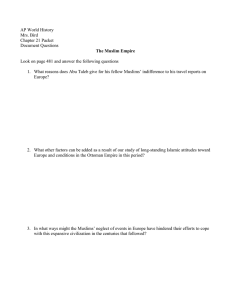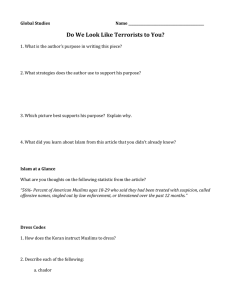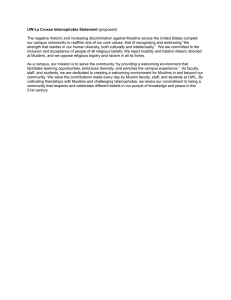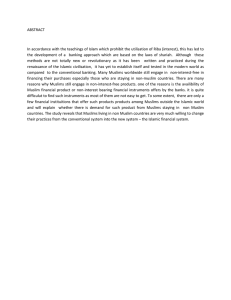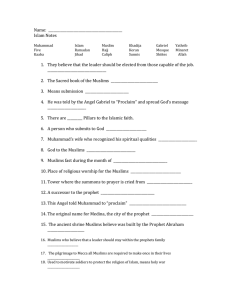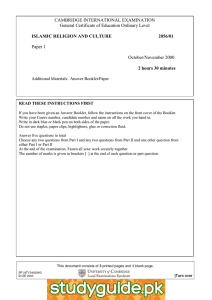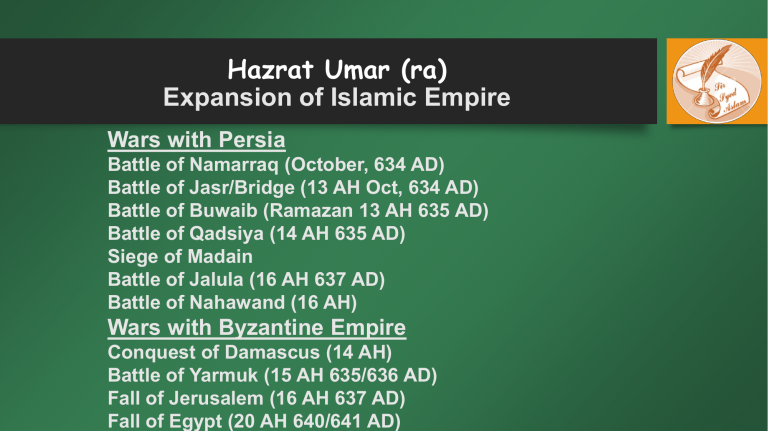
Hazrat Umar (ra) Expansion of Islamic Empire Wars with Persia Battle of Namarraq (October, 634 AD) Battle of Jasr/Bridge (13 AH Oct, 634 AD) Battle of Buwaib (Ramazan 13 AH 635 AD) Battle of Qadsiya (14 AH 635 AD) Siege of Madain Battle of Jalula (16 AH 637 AD) Battle of Nahawand (16 AH) Wars with Byzantine Empire Conquest of Damascus (14 AH) Battle of Yarmuk (15 AH 635/636 AD) Fall of Jerusalem (16 AH 637 AD) Fall of Egypt (20 AH 640/641 AD) Expansion of Islamic Empire Wars with Persia Battle of Namarraq (October, 634 AD): • Khalid (ra) had conquered most of Iraq in Abu Bakr (ra) time • The Persians rescued areas • Abu Bakr (ra) had advised to continue the campaigns in Iraq. • Umar (ra) sent a campaing under Abu Ubaida Saqafi to Iraq • The Persians were defeated. Battle of Jasr/Bridge (13 AH Oct, 634 AD): • • • • • • • • • • • • • • • Large Persian army under Bahman Abu Ubaydah encamped Euphrates Bahman invited Abu Ubaida to cross the river Many suggested not to cross the river Muslims crossed the river by bridge of boats. The Persians were on war-elephants The horses of Muslims army bolted Muslims decided to fight on foot Many Muslims rolled under elephants including Abu Ubaida Musanna took the charge Someone broke the bridge to avoid escape Muslims jumped into the river Musanna reconstructed the bridge Just 3000 Muslims stayed with him They stopped the Persian to advance further. Battle of Buwaib (Ramazan 13 AH 635 AD) • • • • • • • • • • • • • After Battle of Jasr, Umar (ra) motivated the public Thousands of Arabs gathered against the Persians Musanna also raised a huge army The Persians selected Mahran with a huge army He had got the training in Arab environment Muslims camped at Buwaib near by the Euphrates. This time the Persians crossed the river. A fierce battle took place Many Muslims martyred Persian commander was killed by a Christian Arab Persians were defeated Musanna stopped their way to escape Almost the entire Iraq fell on the hands of Muslims. Battle of Qadsiya (14 AH 635 AD) • After the defeat at Buwaib Yezdgard was made the ruler This blew new spirit in the Persians The areas conquered by Muslims were rescued. Umar (ra) called Musanna back. • Motivated for Jihad He intended to set out himself But leading companions suggested to stay back • Saad bin Abi Waqqas (ra) was the commander Not a single affair could be settled without Umar’s (ra) approval. Musanna was awaiting for Saad with his 8000 men at Zi-Qar. • Musanna passed away due to injuries of Jasr. his brother conveyed Saad advices of Musanna. Muslim army 30000. Saad (ra) camped at Qadsiya. • Rustum was made the chieftain of the force Musanna sent an envoy to invite him to Islam He gave a basket of earth to the envoys as a sign of disrespect. • Muslims took it as he gave the control Rustum was not willing to fight He tried to establish a treaty. • Rabi bin Aamir was sent but it did not work The battle started in Muharram 14 AH. • Saad (ra) was sick and was issuing the order from his place Umar (ra) sent 3000 men with Qa’Qa’ (ra). • Fierce combats continued for 3 days, 4 nights. Rustum was killed • It broke the backbone of the Persian Over 30000 of Persian were killed while 8000 of Muslims expired. Siege of Madain • • • • • • Saad then camped near by the river Dajla. The Persians blocked ways to cross the river. Saad (ra) put the horses into river Muslims crossed the entire river by walking Persians shouted, “Jinns are coming” They escaped from the city leaving their possessions behind. Muslim got a huge amount of booty. Battle of Jalula (16 AH 637 AD) • • • • • • • After the capture of Madain the Persian ruler escaped to Hulwan. He deputed his army in Jalula They dug a deep ditch around the town. Muslims laid the siege of the town for a seven months Eventually the Persian came out to attack. Allah sent a storm during the battle. The Persians fell back and were killed Battle of Nahawand (16 AH) • • • • Yezdgard escaped to “Raey” He deputed Khusro to face the Muslims. The Persians were defeated here as well Their might was shattered forever. Wars with Byzantine Empire • The Eastern Roman Empire was consisting of Syria, Jerusalem and Egypt. It was also called the Byzantine Empire. This was the place whom the Prophet (saw) had sent the invitation of Islam and the envoy was killed by Syrian governor. Khalid bin Walid (ra) on the command of the caliphs had left Iraq and had laid the siege of Damascusthe capital of Syria. Conquest of Damascus (14 AH) • The attacks on Syria had been started during the time of Abu Bakr (ra). • Khalid was on this front. He had laid the siege of Damascus. • Muslims didn’t get the way to enter the city. • Muslims observed volunteer fasting, Khalid (ra) suffered, they got the way to enter the city • Loosing Damascus made the Christians very aggressive. • They gathered their forces in Jordan and raised an army of 40000 men. Conquest of Damascus (Contd.) • Muslims advanced towards Jordan. • The Romans demolished the dams to stop Muslims. • They wanted to set up a peace treaty. • Muaz bin Jabal (ra) was nominated for the task. • Abu Ubaida (ra) started the attack. The Romans were 50000. • Romans were defeated. The public was given peace. • Their religious places and houses were not demolished. • After the fall of Jordan, the Muslims advanced towards Emmessa and captured it too. Battle of Yarmuk (15 AH 635/636 AD) • • • • • • • • • • • • • The fled Romans took refuge in Antioch. They pleaded to Heraclius He raised an army of 260000. The Christians of the conquered areas were supporting Muslims. Muslims from all sides started gathering at Yarmuk in Jordan Umar (ra) sent another 1000 men alongwithh Saeed bin Aamir A fierce battle broke up. The Christians tried to offer bribes Muslims offered them the usual three options The Romans decided to fight. A bloody battle took place for 6 days. Over 100000 men of Christians and 3000 Muslims were killed. Heraclius escaped to Constantinople. Later many of the Christian embraced Islam. This victory decided the fate of almost the entire Byzantine Empire. The rest of areas were conquered without much difficulty. Fall of Jerusalem (16 AH 637 AD) • After the battle of Yarmuk, Muslims advanced towards it and laid its siege. • On the arrival Muslims the people of the city offered surrender if the caliphs himself would come to collect the keys of the city as they had found this prophecy in their religious books. • Umar (ra) went himself and they handed over the keys • A treaty was drawn up, guaranteeing security of life, property and Churches. • An easy Jizya was settled with them. • Umar (ra) went to Jerusalem and offered Sajda Dawood at the place where Prophet Dawood (as) used to pray. Fall of Egypt (20 AH 640/641 AD) • Thousands of Muslim passed away in contagion including Muaz bin Jabal, Abu Ubaida and others. • Amr bin Aas suggested Umar (ra) to send him for Egypt.He agreed and sent 4000 men with him. • Umar (ra) sent another 10000 men. Maquqas took refuge in a fortress • They laid the siege of the fortress . Zubair (ra) jumped into the fortress and opened the door. • Muslims army entered the fortress. Maquqas requested for peace treaty and the Muslims accepted it. • When Heraclius came to know, he sent a big force • Muslims were 12000 and the enemy was 50000. Muslims laid the siege of the city. Fall of Egypt (20 AH 640/641 AD) • Maquqas didn’t want to fight but the Roman officers kept on insisting him • So he took safety and peace for the Copts. The Copts were supporting the Muslims. • After a long combat the Muslims forced the Romans to retreat back into their fortress. • The Romans also re-attacked and pushed the Muslims outside the fortress and closed its doors. • The siege of the fortress continued for seven months. Amr bin Aas (ra) rearranged his forces and motivated • Thousands of Copts and Romans were captured. • They were given option of Islam or Jizya. Majority of them accepted Islam.
